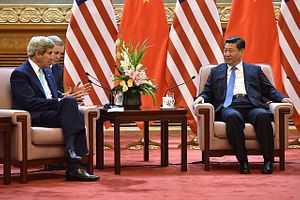India, Iran and Israel joined. Europe’s leading economies – France, Germany, Italy, Switzerland, and United Kingdom – are approved members. Russia is in. Saudi Arabia and the United Arab Emirates are on board. Australia and South Korea are confirmed. Japan has allocated $1.5 billion for AIIB membership, though Tokyo is assessing AIIB’s governance framework and will decide in June. Canada is considering. North Korea’s application was rejected. Currently, 57 countries are confirmed founding members. The United States stands alone.
Critics of the U.S. decision not to join see Washington sidelined as allies jump on the AIIB bandwagon. Proponents of Washington’s position, mainly Obama administration officials, decry the absence of transparent governance standards and competition with the World Bank and Asian Development Bank, even though both banks have endorsed the AIIB. The White House’s concerns over AIIB’s environmental and social responsibility framework, though valid, miss the bigger picture. What is the strategic significance of the AIIB for the next US president and US rebalance to Asia?
Geopolitics. A U.S. president with a clear vision of U.S. leadership in Asia would see the geopolitical context of the AIIB. In tandem with the New Silk Road, Maritime Silk Road, and Air Defense Identification Zone, the AIIB reflects the symbiosis of Chinese soft power prowess and hard power calculations. Both serve to fortify China’s growing stature and leverage in recasting the region’s strategic landscape with China at the epicenter. The decision of 57 countries to join the AIIB suggests that a tectonic shift toward a new world economic order is underway. China has surpassed the United States as the world’s largest economy in purchasing-power parity terms and will eventually bridge the GDP gap with the U.S., according to U.S. Department of Agriculture data. It is, therefore, increasingly incumbent on Washington and the next administration to ascertain how the United States will shape this emerging Asia-centric global economic system. To this end, moving the Trans-Pacific Partnership (TPP) – the crux of the U.S. rebalance to Asia – forward requires the White House and Congress to prevent local politics from trumping national economic interests, and constraining long-term geopolitical leverage in the region.
Governance. The next U.S. administration would see that the rebalance could be advanced if AIIB fosters a culture of transparent governance and social responsibility throughout Asia. The real proof of AIIB’s efficacy is for China to ensure that the level of AIIB governance standards is commensurate with those of the World Bank, International Monetary Fund and Asian Development Bank. Whether it is forging the Pakistan-China economic corridor to connect gas and oil pipelines to Middle East, building agriculture, telecommunications and transportation infrastructure in Africa or constructing ports in the Indian Ocean, funding and implementation oversight of China’s investments in global megaprojects have and will continue to warrant investor, stakeholder and policy scrutiny. Perceptions of corruption continue to taint China’s international image despite President Xi Jinping’s ongoing anti-corruption campaign. China ranked 100th among 175 countries in Transparency International’s 2014 Corruption Perceptions Index – a significant drop from its 80th in the 2013 index. With the establishment of the AIIB, China will need to demonstrate credible accountability in upholding international rules and norms.
Currency. One main function of the AIIB will be to facilitate the internationalization of China’s currency – renminbi (RMB). While the next White House may understand the impact of RMB internationalization on global capital markets, it will face the challenge of managing the domestic politics of Chinese currency with Congress and constituents. Congressional review over current TPP legislation, which includes an amendment against Chinese currency manipulation, is just as much a political contest as it is a “greenback vs redback” currency debate. By joining AIIB, Singapore and London – both global financial leaders – will strengthen their market positions as centers for RMB-denominated offshore transactions. London intends to be the first RMB clearing house outside Asia, according to the U.K. Chancellor of the Exchequer George Osborne. The AIIB founding and RMB internationalization are interlinked vectors driving economic integration between Asia and the rest of the world. US allies are capitalizing on this trend. U.S. presidential candidates would benefit from grasping its long-term impact on the U.S. rebalance to Asia.

































